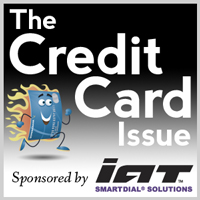“If you could have one superpower, what would it be?”
One often hears this icebreaker question at parties and corporate events. There are many good superpower options; these days, though, I think I’d be most likely to choose the ability to see the future before it happens. Especially the economic future.
The economic situation has been wild for several years; so many people would like to have that superpower. Unfortunately, we’re relegated to making our best guesses using economic indicators like sales data and earnings reports.
 One indicator often in the news is consumer credit card usage. Credit card usage has been up this year for the first time in several years – in March, American Express reported spending was up 13% over last year, with Visa 9% up, and MasterCard 5%.
One indicator often in the news is consumer credit card usage. Credit card usage has been up this year for the first time in several years – in March, American Express reported spending was up 13% over last year, with Visa 9% up, and MasterCard 5%.
In addition, consumers are paying on time. American Express has just 1.6% of all balances coming in late, which is even better than before the recession, while JP Morgan has 2.66%, which hasn’t been seen since 2006.
So are these good signs for our economy? As with all things future, and no superpowers to tell us otherwise, the answer is…
“MAYBE!”
Increased credit card use might very well indicate our economy is on the upswing. The theory is that consumers are not likely to add debt to their financial picture unless they’re confident of being able to pay it off – a hope closely coupled with the stability of their jobs. Therefore, if credit card usage is up, consumer confidence may be up, too.
Banks are now prohibited from risk-based pricing (changing interest rates if a consumer’s credit risk changed). Therefore, up-front interest rates and flat fees spiked for those with higher risk profiles. However, rates on low interest cards have been falling, attracting more financially stable consumers drawn to better balance transfer terms and other promotions.
Reward programs and incentive programs are also on the rise, enticing consumers who might otherwise pay in cash or refrain from a purchase. A consumer tempted to limp along with their old washing machine might be persuaded to make the purchase if they feel good about their economic prospects for paying the debt down and if the rewards are sufficiently motivating.
That’s all good news, but where there’s a “maybe,” there’s usually a…
“MAYBE NOT.”
It’s possible that the increases in credit card usage do not mean anything to the overall economic outlook. One reason is that the numbers are volatile (subject to huge revisions) and out of date by the time they can be analyzed. Another is that too many things that have little to do with actual consumer confidence can influence the numbers. Reward points, for example, can spur false growth numbers because consumers are essentially using their cards instead of cash, but paying the balances off immediately. (If credit is merely being swapped for cash, as opposed to new debt being truly incurred, growth is not indicated.)
Since the rules on risk-based pricing changed, hand-in-hand with the economic downturns and volatility, banks have been less inclined to offer credit to higher-risk consumers. Many cards were cancelled without much (or any) notification to the consumers. Credit cards aren’t being offered to higher risk consumers, or they come with such high interest rates and fees as to not be appealing.
That puts a damper on consumer buying power. However, the credit card industry’s risk profile is much better than it used to be. The higher risk consumers aren’t on their books as heavily as they once were. Accordingly, the spending numbers should be attributed in part to the consumer profiles driving them. That is, those who are more financially stable might be spending more.
As you can see, consumer credit card usage is far from being a true indicator of the economic future. Nonetheless, if usage trends up and trickles down, then the overall economy might improve. Additionally, if banks are healthier from cleaning up their risks, that’s good for business overall and ultimately good for consumers overall as employment rises. A more responsible risk profile for banks might not be a superpower, but it’s a good start for the future!
As President and CEO , Chris Schumacher provides senior management, leadership and strategic direction for Optio Solutions, a full-service accounts receivable management company headquartered in Petaluma, California. Optio Solutions delivers cost-effective debt collection solutions to small, medium and large businesses and medical offices throughout the country. Optio Solutions has additional offices in Houston and Dallas, Texas and Phoenix, Arizona.







![[Image by creator from ]](/media/images/New_site_WPWebinar_covers_800_x_800_px.max-80x80.png)
![[Image by creator from ]](/media/images/Finvi_Tech_Trends_Whitepaper.max-80x80.png)
![[Image by creator from ]](/media/images/Collections_Staffing_Full_Cover_Thumbnail.max-80x80.jpg)
![Report cover reads One Conversation Multiple Channels AI-powered Multichannel Outreach from Skit.ai [Image by creator from ]](/media/images/Skit.ai_Landing_Page__Whitepaper_.max-80x80.png)
![Report cover reads Bad Debt Rising New ebook Finvi [Image by creator from ]](/media/images/Finvi_Bad_Debt_Rising_WP.max-80x80.png)
![Report cover reads Seizing the Opportunity in Uncertain Times: The Third-Party Collections Industry in 2023 by TransUnion, prepared by datos insights [Image by creator from ]](/media/images/TU_Survey_Report_12-23_Cover.max-80x80.png)
![Webinar graphic reads RA Compliance Corner - Managing the Mental Strain of Compliance 12-4-24 2pm ET [Image by creator from ]](/media/images/12.4.24_RA_Webinar_Landing_Page.max-80x80.png)